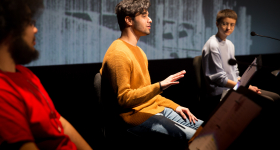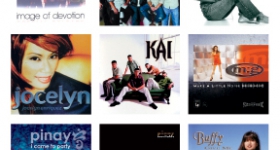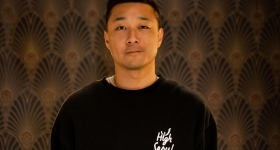Photo by Collin Taylor
Borahm Lee makes up one-half of the electronic duo Break
Science. His chops as a keyboard player are
undeniable, but he flexes his skills way beyond the keys. His live-sampling
trip-hop-meets-dub fuses with musical partner Adam Deitch’s breakbeat-style
drumming -- and the crowd goes wild. The pair met when Deitch was collaborating
with Wyclef Jean, and Lee was working with Lauryn Hill. With their synergy and
flow, it’s no surprise they’ve played such packed festivals as Electric Zoo,
Electric Forest, and Camp Bisco. Before starting his own band, Lee played keys
with superstars like Kanye West, Lauryn Hill and Matisyahu.
We caught up with Lee while on the road in Big Sky, Montana
with electronic music artist Pretty Lights.
Hyphen:
From your eclectic sound, it seems like you were raised on many different types
of music. What are some of the sounds that find their way into Break Science?
Lee: Being born in the Bronx in the ‘80s and
raised in New York City, Hip-Hop was always around me, and I was always drawn to
it. Public Enemy and Run DMC were big influences. Some R&B stuff, too, but
really Hip-Hop was the big influence for me. My mom’s an opera singer, and she
also played piano, so she forced [my older brother and me] to take classical
piano lessons. I hated it. So, when I was about 13 or 14, she let me stop
taking lessons. As soon as I stopped doing it, I realized that I really [loved]
it. Towards the end of that period of classical training, I was able to pick up
blues and jazz. So then I took lessons again, but this time with a jazz piano
teacher.
It’s a constant, evolving process. I’ll bring an idea or
Adam will bring an idea. We’ll get together. Maybe we’ll find some obscure
instrument and start with that sound. It’s always different.
When
did you start performing shows? How did you go from taking piano lessons to
playing with some of the biggest names in music?
When I was about 19 or 20, I was going
to City College in Harlem, and I started to perform doing local jazz gigs and
whatever gigs I could hustle just to make some pocket change. I just kept doing
it, getting away with whatever gigs I could get. It was partly about making
extra money, but the other part was about performing live and gaining stage
experience, meeting other people and connecting. The first big gig I got was
with Lauryn Hill. I just did an audition with a bunch of other piano players,
and I got the gig. I was 24. I also worked with The Fugees and Wyclef. I did a
tour with them in Europe. [I’ve also] worked with Matisyahu, the female
vocalist Ladybug Mecca, Lee Scratch Perry. More recently, I was playing keys
for Kanye West, but I had to give up the gig to do Break Science. I couldn’t
make one gig with Kanye in Brazil, and they didn’t like that. So, I resigned.

Photo by Nikki Digital
Saying
no to Kanye didn’t work out so well, huh? Some might say giving up a chance to
work with an artist that well-known is crazy.
He was actually a lot nicer than a lot
of other big artists I’ve worked with. He’s definitely in control of everything
that’s going on, but he’s got so much going on that he’s thinking about the
little details of what the keyboard player’s going to do and whatnot. But he
did take the time to learn my name. I don’t have a very easy, straightforward
name, and people have a lot of difficulty pronouncing it. So, he took the time
to learn it. That’s very different from [a big name artist that Lee wouldn’t
specify] who just called me “keyboards.” Kanye treated the musicians really
well and always put us up in the same hotels that he stayed in most of the
time, which are very, very nice hotels.
You
were touring the world with some of the biggest acts around. Why even start
your own thing?
Because we’re not completely satisfied
and fulfilled just working for somebody else. It’s not our vision. It’s not all about money, you know. There's definitely more fulfillment.
I’m more driven. I’m enjoying playing more because I’m doing my music now that
I wrote from scratch. So it’s much more gratifying to perform live.

Photo by Collin Taylor
When
you started to play serious shows, and it was very obvious that this was the
lifestyle and the job that you wanted, were your parents supportive of that?
Not really. It’s funny because they
forced me to play piano, and then when I’m like, “Yeah, this is what I want to
do,” they’re like, “We don’t want you to do that.” Because they loved me, they
wanted me to have a stable lifestyle, and they knew that being a musician was
not a stable thing. But eventually they realized that they couldn’t do
anything, and that I was able to support myself and do my thing. But even when
I talk to my dad now, he’s like, “Are you sure you don’t want to be a music
professor at some university?” They still worry about it, and my mom doesn’t
like the fact that I’m traveling on the road all the time. I mean, I understand
that for many Asian Americans, financial stability is a very important thing to
them and their parents, and, obviously, I want to be stable. But at any moment,
you can get hit by a bus or have a heart attack, and at that moment, I would
just want to be happy with what I did and what I’m doing. It’s an unpredictable
lifestyle, but I’m happy.
Follow Borahm and Break Science on
Twitter: @borahmkeys, @breakscience
For upcoming tour dates, visit here.
All photos courtesy of Break Science Facebook
---
Sara Kim
is a writer and musician living in New York City. After working as a
news anchor in Seoul for five years, she's returned stateside to create
in the Big Apple. Contact her at saraannkim [at] gmail.com (saraannkim(at)gmail(dot)com).









Comments